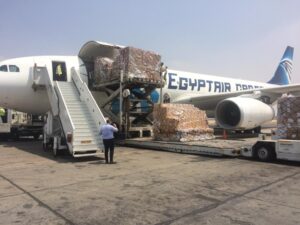
By Mohamed Attia
With the continuing negative repercussions of the coronavirus pandemic and its successive changes on the global air transport industry for the second year in a row, air freight turned during that period into a lifeline for the civil aviation sector.
Brendan Sullivan, Head of Cargo at the International Air Transport Association, said that the air freight industry made revenues worth $129 billion during the post-coronavirus period, which represents about a third of total airline revenues, with an increase of between 10 per cent and 15 per cent compared to pre-crisis levels.
Global air freight revenues are expected to reach $169 billion this year.
He added that air freight has increased in importance during the crisis of the spread of the coronavirus as medical supplies and vital vaccines were transported around the world through it, indicating that air freight became a vital source of income for many airlines when passenger flights stopped.
On the local level, EgyptAir Cargo witnessed a boom in revenues. After the company’s revenues amounted to approximately LE2.4 billion before the outbreak of the pandemic in 2019, the revenues reached LE3.1 billion in 2020 and in 2021. The number jumped to LE4.1 billion.
Minister of Civil Aviation Mohamed Manar confirmed that air cargo activity has doubled in Egypt and the world during the current period, due to the special circumstances that countries are going through due to the novel coronavirus pandemic.
The minister added that the shipments included medicines, medical supplies and other goods. He expected this boom in shipping activity to continue over the next two years.
The minister pointed out that EgyptAir took advantage of passenger planes to transport goods, after obtaining the approval of the aviation authority and the aircraft manufacturer.
He pointed out that there were some requirements that were implemented, including that the goods should not be flammable, liquid or heavy, in addition to the presence of cabin crews on the flight to check goods on board every half hour.

Amr Aboul-Enein, head of EgyptAir Holding Company, said that the national company has a wide network of lines around the world in the field of air freight, whether it is transporting goods on the available spaces on passenger planes that reach 70 planes, or cargo planes from which EgyptAir owns 3 Airbus A330 planes.
There is an ambitious plan to increase the air cargo fleet during the coming period to meet the increasing demand for air cargo activity.

For his part, Ahmed Shaheen, Chairman of the Board of Directors of EgyptAir Cargo, confirmed that the civil aviation system has changed significantly in the recent period and before Covid 19 differs from what is after it due to the stagnation that hit passenger traffic severely after the outbreak of the virus and attention turned to air freight to be a new line pumping money into airlines in the world.
He said that the pandemic has changed the image of air freight, adding that based on the instructions of Minister of Civil Aviation Mohamed Manar to activate the role of air cargo and in coordination with pilot Abu El-Enein, EgyptAir was provided with three Boeing 777 aircraft and their space was used in the best way.
“We even concluded agreements from Vietnam to the US as well as from Hong Kong to the US,” Shaheen said, noting that the contracts of the shipping company were released in the recent period instead of relying on certain agents only.
“Indeed, the impact of this decision was positive, as agents from all countries of the world flocked to us to contract with us, especially with their desire to exploit the important geographical location of Egypt.”

Shaheen added that EgyptAir Cargo signed a contract with an international company to transport 75 cargo flights to the United States with a Boeing 777 and Airbus 330, and high profits were achieved, especially after the fleet was doubled to 6 planes instead of 3 planes.
Shaheen said that the expansion strategy is continuing as it is expected that 5 new aircraft will join, including two wide-model aircraft under the lease finance system, two aircraft that will be joined in 2025, and one that will join at the end of this year.
Shaheen added that the company is also seeking to expand the cargo village at Cairo International Airport, the headquarters of the EgyptAir operations centre, develop the information infrastructure, train human cadres and apply the state’s directions in governance to keep pace with the tremendous development in the movement of e-commerce and benefit from Egypt’s geographical location in the movement of Egyptian goods and exports.






Discussion about this post